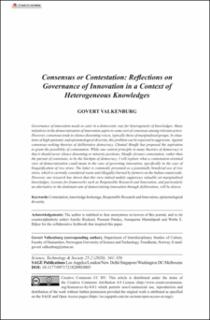| dc.contributor.author | Valkenburg, Govert | |
| dc.date.accessioned | 2020-10-20T13:17:46Z | |
| dc.date.available | 2020-10-20T13:17:46Z | |
| dc.date.created | 2020-01-17T11:59:52Z | |
| dc.date.issued | 2020 | |
| dc.identifier.citation | Science Technology & Society. 2020, 25 (2), 341-356. | en_US |
| dc.identifier.issn | 0971-7218 | |
| dc.identifier.uri | https://hdl.handle.net/11250/2683953 | |
| dc.description.abstract | Governance of innovation needs to cater in a democratic way for heterogeneity of knowledges. Many initiatives in the democratisation of innovation aspire to some sort of consensus among relevant actors. However, consensus tends to silence dissenting voices, typically those of marginalised groups. In situations of high epistemic and epistemological diversity, this problem can be expected to aggravate. Against consensus-seeking theories of deliberative democracy, Chantal Mouffe has proposed the aspiration to grant the possibility of contestation. While one central principle in many theories of democracy is that it should never silence dissenting or minority positions, Mouffe elevates contestation, rather than the pursuit of consensus, to be the linchpin of democracy. I will explore what a contestation-oriented view of democratisation could mean in the case of governing innovation, specifi cally in the case of biogasifi cation of rice straw. The latter is commonly presented as a potentially benefi cial use of rice straw, which is currently considered waste and (illegally) burned by farmers on the Indian countryside. However, our research has shown that this view indeed unduly suppresses valuable yet marginalised knowledges. Lessons for frameworks such as Responsible Research and Innovation, and particularly an alternative to the dominant aim of democratising innovation through deliberation, will be drawn. | en_US |
| dc.language.iso | eng | en_US |
| dc.publisher | Sage Publications | en_US |
| dc.rights | Navngivelse 4.0 Internasjonal | * |
| dc.rights.uri | http://creativecommons.org/licenses/by/4.0/deed.no | * |
| dc.title | Consensus or contestation: reflections on governance of innovation in a context of heterogeneous knowledges | en_US |
| dc.type | Peer reviewed | en_US |
| dc.type | Journal article | en_US |
| dc.description.version | publishedVersion | en_US |
| dc.source.pagenumber | 341-356 | en_US |
| dc.source.volume | 25 | en_US |
| dc.source.journal | Science Technology & Society | en_US |
| dc.source.issue | 2 | en_US |
| dc.identifier.doi | 10.1177/0971721820903005 | |
| dc.identifier.cristin | 1775687 | |
| dc.description.localcode | Creative Commons CC BY: This article is distributed under the terms of the Creative Commons Attribution 4.0 License (http://www.creativecommons. org/licenses/cc-by/4.0/) which permits non-Commercial use, reproduction and distribution of the work without further permission provided the original work is attributed as specified on the SAGE and Open Access pages (https://us.sagepub.com/en-us/nam/open-access-at-sage). | en_US |
| cristin.ispublished | true | |
| cristin.fulltext | original | |
| cristin.qualitycode | 1 | |

